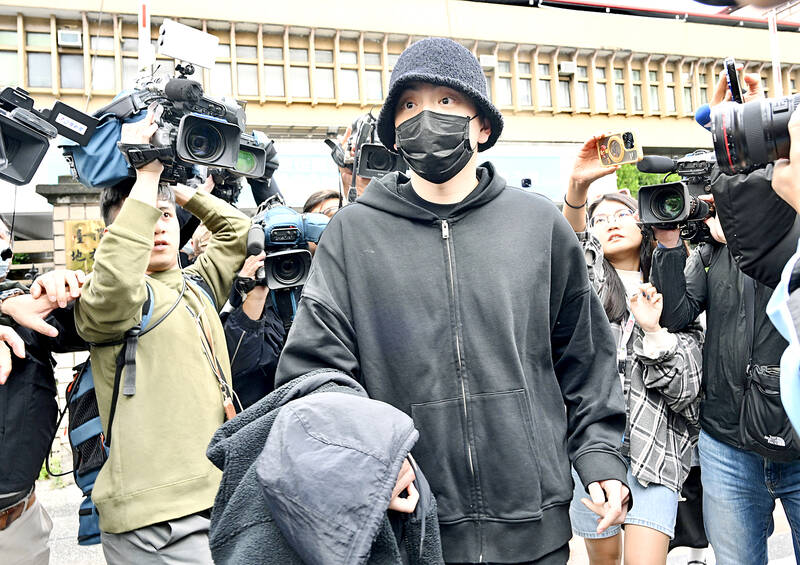New Taipei City prosecutors yesterday indicted nine entertainers over their alleged connection to a fraud ring that produces falsified documents to help people evade military service, including actor Darren Wang (王大陸) and show host William Liao (廖威廉).
Twenty-eight people were charged with contravening the Punishment for Violation of Military Service System Act (妨害兵役治罪條例) and Article 214 of the Criminal Code for “causing a public official to make a false entry in a public document.”
Prosecutors alleged the fraud ring was ran by a man, Chen Chih-ming (陳志明), and his three assistants, and that they were paid to help people dodge compulsory military service by taking advantage of loopholes in medical examinations, using substitutes and falsifying documents.

Photo: Lo Pei-de, Taipei Times
Evidence showed that Chen received a total of NT$7.63 million (US$258,469) from “draft dodgers” from 2016, when the operation began, until it was shut down in January, prosecutors said.
Wang, 34, allegedly paid the highest fee of NT$3.6 million and is the most prominent star embroiled in the case, the indictment read.
The rest paid between NT$50,000 and NT$500,000, it said.
Other famous figures indicted in the case included singer Nine Chen (陳零九), Daniel Chen (陳大天) and Jushe Lee (李銓).
Taiwan requires all able-bodied males aged 18 to 36 to serve mandatory military service.
Those with certain physical or medical conditions may be exempted, but they must be certified through medical examinations that are conducted under the supervision of military conscription officers.
Wang, who mainly worked in China, allegedly handed his National Health Insurance Card to Chen for processing and paid a fee to evade military service, prosecutors said.
The fraud operation was shut down in January when Chen was arrested. When Wang applied for a new health insurance card in February, he claimed he had lost it.
His attempt to dodge military service led prosecutors to charge him with offenses of “causing a public official to make a false entry in a public document.”
An investigation found that Chen and his assistants taught people ways to cheat the blood pressure test, including sending a substitute to take the test, and use other loopholes, such as altering test results to indicate physical abnormalities, the prosecutors said.
When the “dodgers” go for a second round of examinations, they would again use deception and falsified papers to get exempted from military service, they said.

Taiwan is projected to lose a working-age population of about 6.67 million people in two waves of retirement in the coming years, as the nation confronts accelerating demographic decline and a shortage of younger workers to take their place, the Ministry of the Interior said. Taiwan experienced its largest baby boom between 1958 and 1966, when the population grew by 3.78 million, followed by a second surge of 2.89 million between 1976 and 1982, ministry data showed. In 2023, the first of those baby boom generations — those born in the late 1950s and early 1960s — began to enter retirement, triggering

One of two tropical depressions that formed off Taiwan yesterday morning could turn into a moderate typhoon by the weekend, the Central Weather Administration (CWA) said yesterday. Tropical Depression No. 21 formed at 8am about 1,850km off the southeast coast, CWA forecaster Lee Meng-hsuan (李孟軒) said. The weather system is expected to move northwest as it builds momentum, possibly intensifying this weekend into a typhoon, which would be called Mitag, Lee said. The radius of the storm is expected to reach almost 200km, she said. It is forecast to approach the southeast of Taiwan on Monday next week and pass through the Bashi Channel

NO CHANGE: The TRA makes clear that the US does not consider the status of Taiwan to have been determined by WWII-era documents, a former AIT deputy director said The American Institute in Taiwan’s (AIT) comments that World War-II era documents do not determine Taiwan’s political status accurately conveyed the US’ stance, the US Department of State said. An AIT spokesperson on Saturday said that a Chinese official mischaracterized World War II-era documents as stating that Taiwan was ceded to the China. The remarks from the US’ de facto embassy in Taiwan drew criticism from the Ma Ying-jeou Foundation, whose director said the comments put Taiwan in danger. The Chinese-language United Daily News yesterday reported that a US State Department spokesperson confirmed the AIT’s position. They added that the US would continue to

The number of Chinese spouses applying for dependent residency as well as long-term residency in Taiwan has decreased, the Mainland Affairs Council said yesterday, adding that the reduction of Chinese spouses staying or living in Taiwan is only one facet reflecting the general decrease in the number of people willing to get married in Taiwan. The number of Chinese spouses applying for dependent residency last year was 7,123, down by 2,931, or 29.15 percent, from the previous year. The same census showed that the number of Chinese spouses applying for long-term residency and receiving approval last year stood at 2,973, down 1,520,